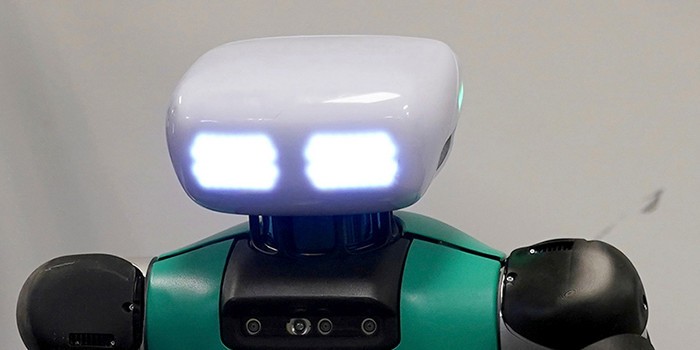(Headline USA) An AI robot, ElliQ, has been created to keep senior citizens company.
Joyce Loaiza lives alone, but when she returns to her apartment at a Florida senior community, the retired office worker often has a chat with a friendly female voice that asks about her day.
A few miles away, the same voice comforted 83-year-old Deanna Dezern when her friend died. In central New York, it plays games and music for 92-year-old Marie Broadbent, who is blind and in hospice, and in Washington state, it helps 83-year-old Jan Worrell make new friends.
The women are some of the first in the country to receive the robot ElliQ, whose creators, Intuition Robotics, and senior assistance officials say is the only device using artificial intelligence specifically designed to alleviate the loneliness and isolation experienced by many older Americans.
The device, which looks like a small table lamp, has an eyeless, mouthless head that lights up and swivels.
It remembers each user’s interests and their conversations, helping tailor future chats, which can be as deep as the meaning of life or as light as the horoscope.
ElliQ tells jokes, plays music and provides inspirational quotes. On an accompanying video screen, it provides tours of cities and museums. The device leads exercises, asks about the owner’s health and gives reminders to take medications and drink water. It can also host video calls and contact relatives, friends or doctors in an emergency.
Intuition Robotics says none of the conversations are heard by the company, with the information staying on each owner’s device.
Intuition Robotics CEO Dor Skuler said the idea for ElliQ came before he launched his Israeli company eight years ago. His widowed grandfather needed an aide, but the first didn’t work out. The replacement, though, understood his grandfather’s love of classical music and his “quirky sense of humor.”
Skuler realized a robot could fill that companionship gap by adapting to each senior’s personality and interests.
“It’s not just about (ElliQ’s) utility. It’s about friendship, companionship and empathy,” Skuler said.
“That just did not exist anywhere.”
The average user interacts with ElliQ more than 30 times daily, even six months after receiving it, and more than 90% report lower levels of loneliness, he said.
The robots are mostly distributed by assistance agencies in New York, Florida, Michigan, Nevada and Washington state, but can also be purchased individually for $600 a year and a $250 installation fee. Skuler wouldn’t say how many ElliQs have been distributed so far, but the goal is to have more than 100,000 out within five years.
That worries Brigham Young University psychology professor Julianne Holt-Lunstad, who studies the detrimental effects loneliness has on health and mortality.
Although a device like ElliQ might have short-term benefits, it could make people less likely to seek human contact. Like hunger makes people seek food and thirst makes them seek water, she said “that unpleasant feeling of loneliness should motivate us to reconnect socially.”
Satiating that with AI “makes you feel like you’ve fulfilled it, but in reality you haven’t,” Holt-Lunstad said. “It is not clear whether AI is actually fulfilling any kind of need or just dampening the signal.”
Skuler and agency heads distributing ElliQ agreed it isn’t a substitute for human contact, but not all seniors have social networks. Some are housebound, and even seniors with strong ties are often alone.
“I wish I could just snap my fingers to make a person show up at the home of one of the many, many older adults that don’t have any family or friends, but it’s a little bit more complicated,” said Greg Olsen, director of the New York State Office for the Aging. His office has distributed 750 of the 900 ElliQs it acquired.
Charlotte Mather-Taylor, director of the Broward County, Florida, Area Agency on Aging, said the COVID-19 pandemic and its aftermath left many seniors more isolated. Her agency has distributed 300 ElliQs, which she believes breaks them out of their shells.
“She’s proactive and she really engages the seniors, so it gives them that extra kind of interaction,” she said. “We’ve seen very positive results with it. People generally like her and she makes them smile and brings joy.”
Skuler said ElliQ was purposely designed without eyes and a mouth so it wouldn’t fully imitate humans. While “Elli” is the Norse goddess of old age, he said the “Q” reminds users that the device is a machine. He said his company wants “to make sure that ElliQ always genuinely presents herself as an AI and doesn’t pretend to be human.”
“I don’t understand why technologists are trying to make AI pretend to be human,” he said. “We have in our capacity the ability to create a relationship with an AI, just like we have relationships with a pet.”
But some of the seniors using ElliQ say they sometimes need to remember the robot isn’t a living being.
Adapted from reporting by the Associated Press

